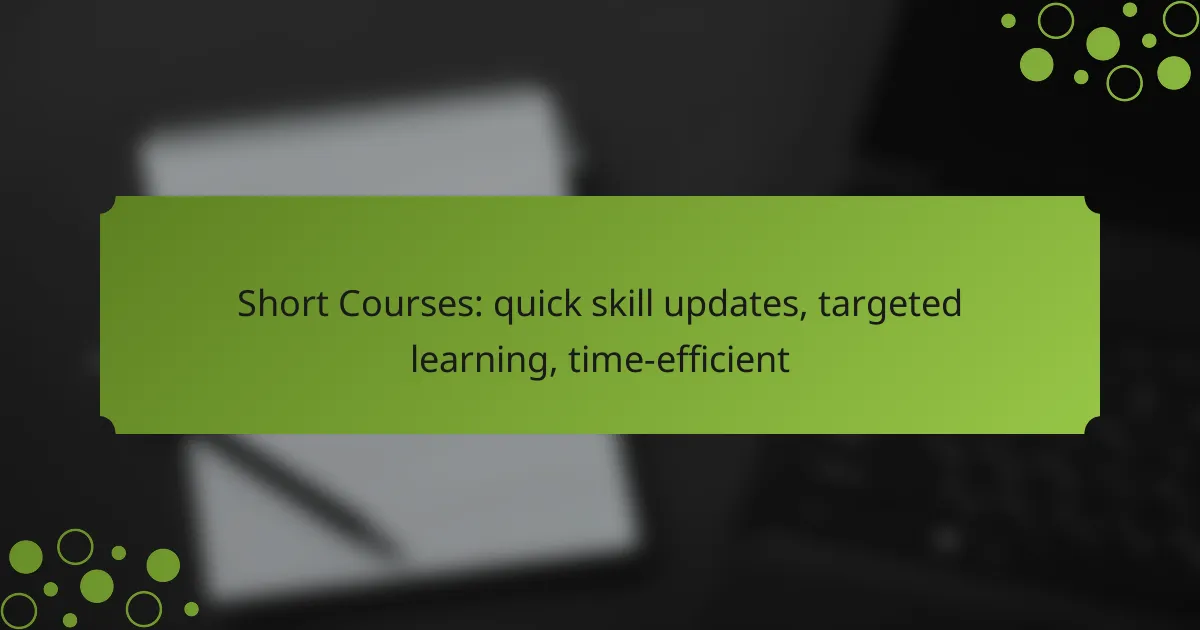
Short courses offer an effective way to quickly update your skills in high-demand fields such as data science, digital marketing, and project management. Designed for time efficiency, these programs provide targeted learning that can enhance your career prospects and meet the evolving demands of the job market.

What are the best short courses for skill updates in the UK?
The best short courses for skill updates in the UK focus on high-demand areas like data science, digital marketing, and project management. These courses are designed to be time-efficient, providing targeted learning that can quickly enhance your skill set.
Data Science Bootcamp by General Assembly
The Data Science Bootcamp offered by General Assembly is an intensive program that equips learners with essential data analysis skills. This course typically spans around 12 weeks and covers topics such as Python programming, data visualization, and machine learning fundamentals.
Participants engage in hands-on projects, which help solidify their understanding of data science concepts. It’s ideal for those looking to transition into tech roles or enhance their analytical capabilities in their current positions.
Digital Marketing Essentials by Google
Google’s Digital Marketing Essentials course is a comprehensive introduction to the key concepts of digital marketing. This course can be completed in a few weeks and covers areas such as search engine optimization (SEO), social media marketing, and online advertising.
With practical examples and case studies, learners can apply their knowledge directly to real-world scenarios. This course is particularly beneficial for small business owners or marketing professionals aiming to boost their online presence.
Project Management Fundamentals by Coursera
The Project Management Fundamentals course on Coursera provides a solid foundation in project management principles. Typically lasting about four weeks, it covers essential topics like project planning, execution, and risk management.
This course is suitable for individuals seeking to improve their organizational skills or those aspiring to become certified project managers. It emphasizes practical tools and methodologies, making it relevant for various industries.

How can short courses enhance career prospects?
Short courses can significantly enhance career prospects by providing targeted skills that meet current job market demands. These programs are designed to be time-efficient, allowing individuals to quickly acquire relevant knowledge and competencies that can lead to better job opportunities and career advancement.
Increased employability through targeted skills
Short courses focus on specific skills that employers are actively seeking, making participants more attractive candidates. For example, a digital marketing course can equip learners with the latest tools and strategies, directly aligning their skills with industry needs.
Consider the growing demand for data analysis skills in various sectors. Completing a short course in data analytics can boost your employability by demonstrating your ability to interpret data and make informed decisions, which is a highly valued competency across many job roles.
Networking opportunities with industry professionals
Participating in short courses often provides access to a network of industry professionals, which can be invaluable for career growth. Many courses include guest lectures or workshops led by experts, offering insights and connections that can lead to job opportunities.
Additionally, engaging with fellow participants can foster relationships that may result in collaborative projects or referrals. Building a professional network through these courses can enhance your visibility in your field and open doors to new career paths.

What are the most popular online platforms for short courses?
The most popular online platforms for short courses include Udemy, edX, and LinkedIn Learning. These platforms offer a wide range of courses tailored to various skill levels and professional needs, making them ideal for quick skill updates and targeted learning.
Udemy for diverse topics
Udemy is known for its extensive library of courses covering a multitude of subjects, from programming to photography. With thousands of options, learners can find courses that fit their interests and career goals.
Courses on Udemy are typically created by industry professionals and can vary in length, often ranging from a few hours to several weeks. This flexibility allows learners to choose courses that fit their schedules and learning preferences.
When selecting a course, consider checking user reviews and ratings to gauge the quality and relevance of the content. Look for courses that offer lifetime access, so you can revisit materials as needed.
edX for university-level courses
edX provides access to high-quality courses from top universities and institutions, making it ideal for those seeking academic rigor. Many courses are available for free, with an option to pay for a verified certificate upon completion.
Courses on edX often follow a structured format, including video lectures, quizzes, and assignments. This format can help learners stay engaged and track their progress effectively.
For those interested in earning academic credit, some edX courses can be part of a MicroMasters program or professional certificate, which can enhance your resume and career prospects.
LinkedIn Learning for professional development
LinkedIn Learning focuses on professional development, offering courses that enhance skills relevant to the workplace. With a subscription model, users gain unlimited access to thousands of courses across various industries.
The platform’s integration with LinkedIn allows for easy sharing of completed courses on your profile, showcasing your commitment to continuous learning. Courses are designed to be concise, often lasting less than two hours, making them suitable for busy professionals.
To maximize your learning, consider setting specific goals for what skills you want to acquire and regularly updating your LinkedIn profile with new skills and certifications earned through the platform.

What criteria should I consider when choosing a short course?
When selecting a short course, focus on its relevance to your career goals, the qualifications of the instructor, and the course format. These factors will help ensure that the learning experience is both effective and aligned with your professional aspirations.
Course content relevance to career goals
Assessing the relevance of course content to your career goals is crucial. Look for courses that specifically address skills or knowledge gaps you have identified in your current role or desired position. For example, if you aim to move into digital marketing, a course covering SEO and social media strategies would be beneficial.
Consider the course syllabus and outcomes. A well-structured course should clearly outline what you will learn and how it applies to your field. If possible, seek feedback from past participants to gauge the course’s effectiveness in meeting career objectives.
Instructor qualifications and experience
The qualifications and experience of the instructor can significantly impact the quality of the course. Research the instructor’s background, including their professional experience in the subject matter and any relevant certifications. An instructor with real-world experience can provide practical insights that enhance learning.
Additionally, consider the instructor’s teaching style and student feedback. Look for reviews or testimonials that highlight their ability to engage students and convey complex concepts clearly. A qualified instructor can make the learning process more effective and enjoyable.

What are the pricing models for online short courses?
Online short courses typically follow two main pricing models: subscription-based access and one-time payments for individual courses. Each model has its advantages and considerations, depending on your learning goals and budget.
Subscription-based access on platforms like Skillshare
Subscription-based access allows learners to pay a recurring fee, often monthly or annually, to access a wide range of courses. Platforms like Skillshare offer this model, providing flexibility to explore various subjects without committing to individual course fees.
Consider the value of unlimited access if you plan to take multiple courses. However, be mindful of the subscription cost, which can range from around $10 to $30 per month, depending on promotions and the length of commitment.
One-time payment for individual courses on Udemy
One-time payment models, such as those used by Udemy, require learners to pay a fixed price for each course. This can be beneficial if you are interested in a specific skill or topic without the need for ongoing access.
Prices for individual courses on Udemy typically range from $10 to $200, often influenced by discounts and promotions. Ensure you check for reviews and course content before purchasing, as the quality can vary significantly.

How do short courses compare to traditional degrees?
Short courses offer a more focused and time-efficient alternative to traditional degrees, allowing individuals to gain specific skills quickly. They typically require less time and financial investment, making them appealing for those seeking immediate career advancement or skill enhancement.
Shorter duration and lower cost
Short courses usually last from a few days to several weeks, while traditional degrees can take years to complete. This shorter duration means that learners can quickly acquire new skills without the long-term commitment associated with degree programs.
In terms of cost, short courses are generally more affordable, often ranging from a few hundred to a couple of thousand dollars, compared to the tens of thousands typically required for a degree. This makes them accessible for a wider audience, including those on a budget or looking to upskill without incurring significant debt.
When considering short courses, it’s essential to evaluate the potential return on investment. For example, if a course can lead to a promotion or a new job opportunity, the relatively low cost and time commitment may be well worth it.


